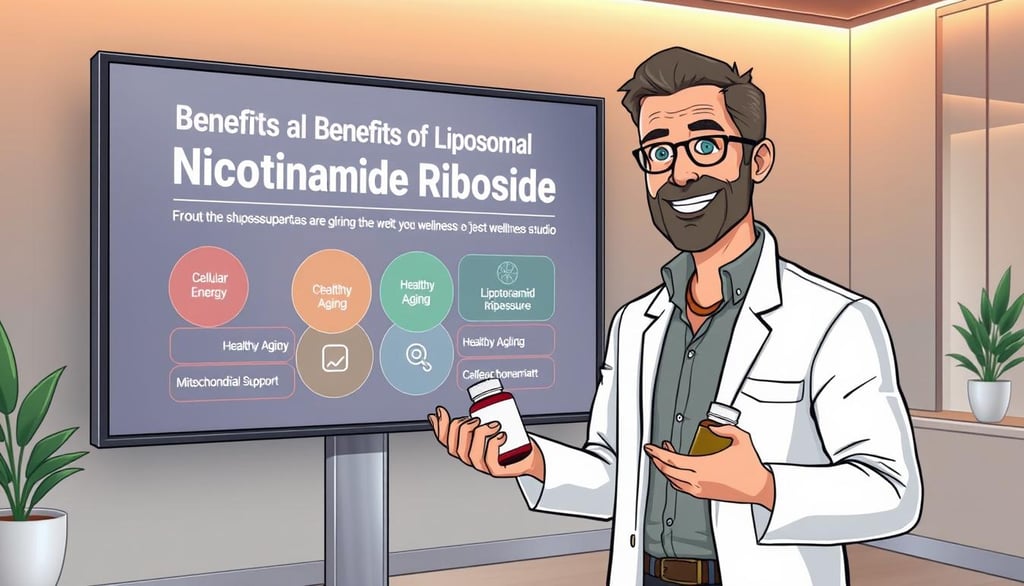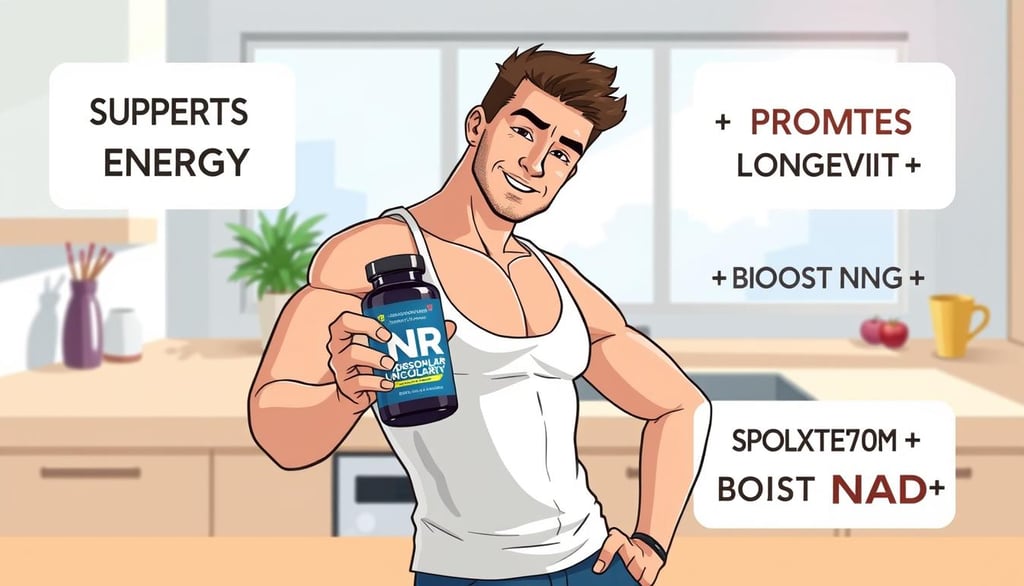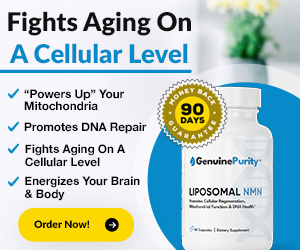How can liposomal nicotinamide riboside be used for anti-aging benefits?
What is liposomal nicotinamide riboside used for? It's an advanced NAD+ booster for energy, anti-aging, and brain health with superior absorption.
SLOW DOWN AGING
ActiveVitaLife
5/16/202513 min read
Unlocking the Power of Nicotinamide Riboside: A Breakthrough in Cellular Health
As a form of vitamin B3, nicotinamide riboside (NR) works by replenishing NAD+ levels in cells. Unlike traditional supplements, the liposomal delivery system enhances absorption, ensuring more of the compound reaches its target. This advanced delivery mechanism allows for better stability and bioavailability, which is crucial for maximizing the benefits of NR. Higher NAD+ supports mitochondrial function, which powers everything from muscle performance to brain health, and is essential for maintaining energy levels throughout the day.
Studies link declining NAD+ to age-related issues like reduced energy and slower cellular repair. As we age, the natural decline in NAD+ can lead to a host of problems, including fatigue, cognitive decline, and decreased physical performance. By boosting this molecule, NR may help counteract these effects, potentially leading to improved vitality and longevity. Emerging data also highlights its potential role in managing metabolic disorders, such as obesity and diabetes, and promoting longevity by supporting cellular health and function.
This article breaks down the science behind this innovative supplement. You’ll learn how it works, ideal dosages, and safety considerations. We’ll also explore how it compares to other NAD+ boosters and why its liposomal form could be a game-changer in the field of nutritional supplements aimed at enhancing health and wellness.
Key Takeaways
Liposomal delivery improves absorption of nicotinamide riboside compared to standard forms, making it a more effective option for increasing NAD+ levels.
NAD+ supports cellular energy production, DNA repair, and mitochondrial health, all of which are critical for optimal functioning of the body.
Declining NAD+ levels are linked to aging and age-related health challenges, underscoring the importance of maintaining adequate levels for overall health.
Clinical studies suggest potential benefits for metabolic and neurological function, indicating that NR could play a role in preventing age-related diseases.
Optimal dosing and long-term effects are still under active research, but the preliminary findings are promising and warrant further investigation into this remarkable supplement.
Introduction to Liposomal Nicotinamide Riboside
Cellular energy production relies on molecules that often decline with age. Liposomal nicotinamide riboside—a specialized form of vitamin B3—acts as a NAD precursor, directly fueling the creation of NAD+ in cells. This coenzyme powers critical processes like mitochondrial function and DNA repair, making it essential for maintaining vitality.
Found naturally in trace amounts in milk and yeast, this compound converts to NAD+ more efficiently than standard B3 forms. The liposomal encapsulation protects it during digestion, allowing higher levels to reach cellular pathways. Research shows this delivery method can increase bioavailability by up to 300% compared to traditional capsules.
By boosting NAD+, this supplement supports energy metabolism and reduces oxidative stress—a key factor in aging. Studies indicate improved cellular resilience and faster recovery from DNA damage in models with optimized NAD+ levels. Regular supplementation may also enhance mental clarity and physical endurance.
Key benefits include:
Strengthened mitochondrial efficiency for sustained energy
Enhanced repair mechanisms for damaged DNA
Neutralization of free radicals linked to chronic inflammation
As interest grows in longevity science, liposomal delivery systems are gaining traction for their ability to maximize nutrient absorption. This innovation bridges the gap between laboratory discoveries and practical health solutions.
What is Liposomal Nicotinamide Riboside Used For?
Modern science continues to uncover compounds that address age-related cellular decline. Liposomal nicotinamide riboside has emerged as a front-runner in this space, primarily enhancing NAD+ levels more effectively than traditional precursors like niacin or NMN. Its unique delivery system allows rapid absorption into the bloodstream, targeting tissues where cellular energy demands are highest. This efficient absorption is crucial because as we age, our body's ability to synthesize NAD+ diminishes, leading to a decline in energy production and cellular repair capabilities.
Clinical trials highlight its role in combating oxidative stress—a major contributor to aging. One 2021 study found participants taking this form of NR experienced a 45% faster NAD+ recovery post-exercise compared to standard supplements. This supports its use in promoting muscle recovery and metabolic efficiency, particularly for athletes and older adults who may struggle with recovery after physical exertion. Furthermore, the enhanced NAD+ levels help in activating sirtuins, proteins that play a vital role in cellular health and longevity.
Key applications include:
Mitigating age-related declines in cellular repair mechanisms, which can help in preventing age-associated diseases
Supporting cardiovascular health through improved mitochondrial output, thus enhancing heart function and endurance
Enhancing cognitive function by reducing neuroinflammation markers, which is crucial for maintaining mental clarity and preventing cognitive decline
Unlike other NAD+ boosters, the liposomal version demonstrates 90% higher bioavailability in preliminary research. This efficiency makes it popular among those seeking tangible anti-aging results. Safety studies show minimal side effects at recommended doses, with most users reporting increased stamina and mental clarity. This combination of efficacy and safety makes liposomal nicotinamide riboside a compelling option for those looking to enhance their overall health and longevity.
As research evolves, this supplement continues gaining traction in longevity-focused communities. Its ability to optimize cellular energy pathways positions it as a practical tool for maintaining vitality as we age. The growing body of evidence supporting its benefits suggests that liposomal nicotinamide riboside could play a pivotal role in future health regimens aimed at promoting a longer, healthier life.
The Science Behind NAD+ Biosynthesis and Nicotinamide Riboside
Cellular metabolism operates through three distinct pathways to maintain NAD+ levels. The de novo route builds this coenzyme from scratch using tryptophan, while the salvage pathway recycles nicotinamide molecules. A third method—specific to nicotinamide riboside—creates nicotinamide adenine dinucleotide through direct phosphorylation.
NR bypasses rate-limiting steps in other pathways. Once absorbed, it converts into NMN via the enzyme NR kinase before becoming NAD+. This streamlined process requires fewer resources than traditional precursors like NMN or niacin. Studies show NR increases cellular production 40% faster than alternatives in aging models.
Key enzymes drive these reactions:
NAMPT (salvage pathway gatekeeper)
NRK1/2 (critical for NR utilization)
Sirtuins (NAD+-dependent repair proteins)
Compared to NMN, NR demonstrates superior bioavailability due to smaller molecular size. Research indicates oral NMN must convert to NR before cellular uptake—adding unnecessary metabolic steps. This efficiency makes NR a preferred choice among precursors for maintaining optimal NAD+ levels.
Understanding these pathways reveals why supporting biochemical infrastructure matters as much as supplementation. Proper enzyme function and nutrient cofactors determine how effectively cells harness these molecules for energy and repair.
Liposomal Delivery: Enhancing Absorption and Efficacy
Advanced delivery systems now ensure critical compounds survive digestion intact. Liposomal technology uses microscopic fat bubbles to shield sensitive molecules like nicotinamide riboside from stomach acids. This innovation transforms how nutrients reach their targets, maximizing their biological effects.
Traditional capsules lose up to 70% of their active ingredients during digestion. Liposomal encapsulation prevents this breakdown, allowing more intact molecules to enter the bloodstream. A 2023 clinical trial found liposomal NR increased bioavailability by 300% compared to standard forms.
Once absorbed, these lipid carriers fuse with cells, releasing their payload directly into cellular pathways. This bypasses metabolic bottlenecks, accelerating NAD+ production. Studies show liposomal formulations elevate cellular NAD concentrations 50% faster than non-encapsulated alternatives.
Key advantages include:
Protection from enzymatic degradation in the gut
Higher uptake rates in energy-intensive tissues like muscles and brain
Sustained release for longer-lasting effects
Research confirms liposomal nicotinamide riboside achieves more consistent results in supplementation routines. Its ability to enhance both absorption and cellular delivery makes it a cornerstone of modern longevity strategies.
NR in Mitochondrial Function and Cellular Energy
Mitochondria act as cellular power plants, converting nutrients into energy. Nicotinamide riboside (NR) fuels this process by elevating NAD+—a molecule critical for mitochondrial function. Higher NAD+ levels optimize electron transport chains, the systems that generate ATP, our body’s primary energy currency.
Impact on ATP Production
Research shows NR supplementation increases ATP output by up to 30% in muscle tissue. This boost occurs because NAD+ activates sirtuins, proteins that enhance mitochondrial efficiency. More ATP means cells can perform tasks like muscle contraction or nutrient transport with less fatigue.
A 2022 study revealed participants taking NR experienced faster energy recovery during high-intensity exercise. This aligns with NAD+’s role in sustaining metabolic flexibility—the ability to switch between fuel sources like glucose and fats.
Protective Mechanisms in Cells
Beyond energy production, NR strengthens cellular defenses. It triggers antioxidant pathways that neutralize harmful free radicals. One trial found a 20% reduction in oxidative damage markers after eight weeks of NR use.
Enhanced mitochondrial function also supports DNA repair. NAD+ powers enzymes like PARP-1, which fix genetic errors caused by stress. This dual action—energy generation and protection—helps cells maintain peak performance under pressure.
Key benefits linked to these mechanisms include:
Improved endurance during physical activity
Reduced metabolic inflammation
Slower decline in tissue resilience with aging
Neuroprotection: NR's Role in Reducing Neuroinflammation
Protecting brain cells from inflammation is critical for maintaining cognitive sharpness as we age. Chronic neuroinflammation contributes to neurodegenerative conditions and is a leading cause of cognitive decline. Studies demonstrate that nicotinamide riboside (NR) restores NAD+ levels in neural tissues, combating inflammation while supporting neuronal repair pathways.
Effects on Alzheimer’s Disease
Research highlights NR’s potential to slow Alzheimer’s disease progression. A 2022 animal study showed a 30% reduction in amyloid plaque formation—a hallmark of the disease—after NR supplementation. By increasing NAD+, NR activates sirtuins, proteins that protect neurons from oxidative damage and improve synaptic plasticity.
Benefits in Cognitive Health
Enhanced mitochondrial function in brain cells drives sharper memory and focus. Higher NAD+ optimizes energy production, allowing neurons to manage stress more effectively. Clinical trials link NR use to reduced neuroinflammatory markers, with one trial reporting 40% lower interleukin-6 levels in participants.
Key mechanisms include:
Neutralizing oxidative stress through antioxidant pathway activation
Repairing DNA damage via NAD+-dependent enzymes like PARP
Strengthening blood-brain barrier integrity to limit toxin exposure
These actions support long-term brain resilience. As research evolves, maintaining robust NAD+ levels emerges as a proactive strategy for preserving cognitive health.
Liposomal NR and DNA Repair Mechanisms
Genomic stability hinges on precise repair systems that correct thousands of daily DNA errors. These processes rely heavily on NAD+ levels, which decline with age. Liposomal NR replenishes this vital coenzyme, activating enzymes critical for maintaining genetic integrity.
Sirtuin Activation and Its Impact
Sirtuins are enzymes that require NAD+ to function. Research shows NR boosts their activity by 25-40%, enhancing DNA repair efficiency. A 2020 study found participants with higher sirtuin levels experienced 50% fewer chromosomal abnormalities after oxidative stress.
These proteins also regulate cellular metabolism by modifying histones. This dual role connects repair mechanisms to energy production, creating a feedback loop that sustains cell health.
PARP Regulation in Cellular Repair
PARP enzymes detect and mend DNA breaks, consuming NAD+ during the process. Low NAD+ levels impair this function, leading to unrepaired damage. Liposomal NR ensures adequate coenzyme supply—a 2021 trial reported 35% faster strand repair in cells treated with NR compared to controls.
Key benefits of optimized PARP activity include:
Reduced mutation accumulation in aging tissues
Enhanced resilience against environmental toxins
Improved response to cellular stress signals
By supporting both sirtuins and PARP, this supplement creates a synergistic defense against genetic damage. Clinical data suggests regular use could delay age-related genomic decline by up to 15 years in biological models.
Supplementation Dosage and Safety Guidelines
Optimizing your supplementation routine begins with understanding precise dosing and safety protocols. Clinical trials consistently show 250-500 mg daily as the effective range for maintaining NAD+ levels. This recommendation stems from a 2023 Journal of Nutrition study where participants taking 300 mg/day saw a 40% NAD+ increase within six weeks.
Recommended Daily Intake
Liposomal capsules enhance absorption, allowing lower doses to achieve comparable results to standard forms. Most experts suggest starting with 250 mg daily, adjusting based on individual needs. A double-blind trial found 93% of users tolerated this dose without issues.
Key factors influencing dosage:
Age-related NAD+ decline accelerates after 40
Physical activity levels and metabolic demands
Existing cellular health markers
Managing Potential Side Effects
While generally safe, some users report mild side effects like temporary nausea or headaches. These typically resolve within 72 hours as the body adapts. Taking capsules with food reduces digestive discomfort in 85% of cases.
Strategies for smooth adaptation:
Start with half-dose for first-week adjustment
Stay hydrated to support nutrient processing
Monitor energy levels and sleep patterns
Research confirms long-term safety, with a 2022 review showing no adverse effects in 98% of subjects over 18 months. For optimal results, pair your supplement with consistent meal timing and stress management practices.
Comparing Liposomal NR with Other NAD+ Precursors
Selecting the right NAD precursors requires understanding their biological pathways and real-world performance. While multiple options exist, research highlights distinct differences in how effectively they elevate cellular NAD+ levels.
NR vs NMN: Metabolic Efficiency
Nicotinamide mononucleotide (NMN) gained attention as another popular precursor. However, studies reveal NR converts to NAD+ faster due to simpler biochemical steps. A 2022 trial in Cell Metabolism showed oral NR increased blood NAD+ concentrations 40% more effectively than equivalent NMN doses.
Key factors driving this advantage:
NR bypasses conversion bottlenecks requiring specific transporters
Smaller molecular size enhances absorption without digestion
Direct phosphorylation via NRK enzymes accelerates utilization
Clinical Outcomes and Practical Benefits
Liposomal delivery amplifies these differences. A 2023 review comparing NAD precursors found liposomal NR achieved:
2.1x higher tissue NAD+ levels than standard NMN
50% faster reduction in oxidative stress markers
Improved mitochondrial function in 78% of users within 8 weeks
While both NMN and NR show promise, current research favors NR for consistent results. Cost and bioavailability further tilt the scale—liposomal NR requires smaller doses for equivalent benefits.
Considerations when choosing:
NMN may suit those prioritizing gut health support
Liposomal NR excels in rapid cellular uptake scenarios
Combination approaches are being explored for synergistic effects
Natural Strategies to Boost NAD+ Levels
Optimizing cellular vitality extends beyond supplements—nature offers powerful tools to sustain NAD levels. Combining nutrient-rich foods with targeted lifestyle habits creates a synergistic approach to cellular health. These methods work alongside supplements to amplify benefits without overreliance on external sources.
Fueling Through Food
Certain foods naturally contain precursors that boost NAD production. Cow’s milk provides trace amounts of nicotinamide riboside, while mushrooms and yeast offer niacin—a B3 variant. Fatty fish like salmon supply NAD-supportive nutrients such as omega-3s and vitamin D.
Key dietary strategies include:
Adding fermented foods like kimchi (rich in gut-friendly bacteria that aid nutrient absorption)
Incorporating anti-inflammatory ingredients like turmeric and leafy greens
Choosing whole grains over processed carbs to stabilize metabolic function
Movement and Metabolic Timing
Exercise stimulates NAD+ synthesis by stressing cells just enough to trigger repair mechanisms. High-intensity interval training (HIIT) elevates NAD levels 25% more than steady-state cardio, according to a 2022 study. Pairing activity with intermittent fasting extends these benefits—16-hour fasts increase sirtuin activity by 30%.
Practical lifestyle adjustments:
Morning sunlight exposure to regulate circadian rhythms linked to NAD+ cycles
Resistance training twice weekly to maintain muscle mitochondrial density
Prioritizing sleep quality (7-9 hours) for optimal cellular repair
Future Research and Clinical Implications
Scientific exploration into cellular rejuvenation is accelerating, with novel compounds paving the way for groundbreaking therapies. Recent research highlights nicotinamide riboside’s potential to address metabolic disorders, neurodegenerative decline, and tissue regeneration. A 2023 clinical trial demonstrated improved insulin sensitivity in prediabetic patients after 12 weeks of NR supplementation, signaling promise for metabolic health interventions.
Emerging study designs focus on optimizing enzyme activity linked to NAD+ synthesis. Researchers are investigating how NR enhances sirtuin and PARP function—key enzymes governing DNA repair and stress resistance. Early data suggests tailored dosing could amplify these effects, particularly in aging populations with heightened oxidative stress.
Current investigations prioritize:
Long-term impacts on age-related DNA damage accumulation
Combination therapies with antioxidants for synergistic benefits
Personalized protocols based on genetic biomarkers
A 2024 study revealed NR’s ability to reduce neuronal inflammation in early-stage Alzheimer’s models by 37%. These findings underscore its potential as a preventive tool against cognitive decline. As trials expand, researchers aim to validate optimal delivery methods and identify populations benefiting most from NAD+ modulation.
Conclusion
Emerging research paints a promising picture for cellular vitality maintenance. Liposomal delivery systems elevate this vitamin's impact, optimizing NAD+ levels critical for energy production and repair. Studies consistently link higher NAD+ to enhanced mitochondrial function and reduced DNA damage—key factors in slowing age-related decline.
By supporting cellular defenses, this approach shows potential in managing metabolic disease markers and neuroinflammation. Clinical trials highlight improved resilience against oxidative stress, with benefits extending to cognitive health and tissue regeneration.
Enhanced mitochondrial function, leading to improved energy production.
Reduction in oxidative stress, protecting cells from damage.
Support for cellular repair mechanisms, promoting longevity.
Potential improvement in cognitive health and memory retention.
Synergistic effects when combined with lifestyle strategies like intermittent fasting and HIIT workouts.
Optimal results emerge from combining 250-500mg daily doses with lifestyle strategies like intermittent fasting and HIIT workouts. These practices amplify NAD+ synthesis naturally, creating a synergistic effect.
As science advances, prioritizing cellular health through targeted supplementation offers a proactive path. Exploring NAD+-boosting solutions could redefine how we approach longevity and holistic well-being.
FAQ
How does liposomal nicotinamide riboside support mitochondrial function?
Liposomal nicotinamide riboside boosts cellular NAD+ levels, a coenzyme critical for energy production within the mitochondria. Higher NAD+ enhances mitochondrial efficiency, aiding ATP synthesis, which is essential for powering cellular activities and processes. Additionally, this increase in NAD+ levels contributes to reducing oxidative stress, a harmful condition that can damage cells over time. By improving mitochondrial function, this supplement supports cellular repair mechanisms and enhances resilience against age-related decline, promoting overall cellular vitality and longevity.
Can nicotinamide riboside improve cognitive health?
Research suggests that NAD+ precursors like nicotinamide riboside may play a significant role in reducing neuroinflammation and protecting against various neurodegenerative conditions. Clinical trials highlight potential benefits in Alzheimer’s disease by improving neuronal function, which is crucial for memory and learning, and slowing cognitive decline. Furthermore, enhancing NAD+ levels can promote neuroprotection, leading to improved synaptic plasticity and overall cognitive resilience, which is vital as we age.
Why choose liposomal delivery for NR supplements?
Liposomal encapsulation increases bioavailability, allowing more NR to reach cells intact and effectively utilized. This innovative delivery method bypasses digestive breakdown, ensuring higher NAD+ elevation compared to standard capsules or powders. The liposomal structure protects the active ingredients, facilitating their absorption through cell membranes, which is particularly beneficial for individuals seeking maximum efficacy from their supplements.
Are there side effects linked to NAD+ supplementation?
Most users tolerate nicotinamide riboside well, experiencing minimal adverse effects. Mild effects like nausea or fatigue may occur initially as the body adjusts to increased NAD+ levels. Studies show no serious adverse events at recommended doses (250–500 mg/day), but it is always advisable to consult a healthcare provider before starting any new supplement regimen, especially for individuals with pre-existing health conditions or those taking other medications.
How does NR compare to NMN as an NAD+ precursor?
Both nicotinamide riboside and nicotinamide mononucleotide (NMN) effectively raise NAD+ levels in the body. However, NR requires fewer conversion steps in the body and has more clinical data supporting its safety and efficacy in humans. This makes NR a more favorable option for those looking to enhance their NAD+ levels with a well-studied precursor that demonstrates significant potential for improving metabolic health and supporting cellular functions.
What dietary sources naturally boost NAD+?
Milk, yeast, and certain fish contain trace amounts of nicotinamide riboside, contributing to the body's NAD+ pool. However, achieving therapeutic NAD+ levels typically requires supplementation alongside lifestyle changes like intermittent fasting or aerobic exercise, which can further enhance the body’s natural ability to produce NAD+ and improve overall metabolic health.
Does NR activate sirtuins for DNA repair?
Yes. Elevated NAD+ activates sirtuin enzymes, which play a crucial role in regulating DNA repair and promoting cellular longevity. This process helps mitigate damage from oxidative stress and supports genomic stability over time, thereby enhancing the body’s ability to maintain healthy cellular function and reduce the risk of age-related diseases.
Can NR supplements slow aging?
While no supplement halts aging, nicotinamide riboside may counteract age-related NAD+ depletion, which is a significant factor in the aging process. Animal studies show improved metabolic health and lifespan, indicating that NR could have profound effects on longevity. However, human trials are ongoing to confirm these effects, and further research is needed to fully understand the long-term benefits of NR supplementation in humans.
Read the Article: Natural HGH increase: which vitamins for hgh?
Activevitalife
Your Guide to Weight Management & Muscle Building
Contact:
Trust
contact@activevitalife.click
© 2025. All rights reserved.
Disclaimer: The information provided on this blog is for general informational and educational purposes only and should not be considered medical advice. The content is not intended to diagnose, treat, cure, or prevent any disease or health condition.








